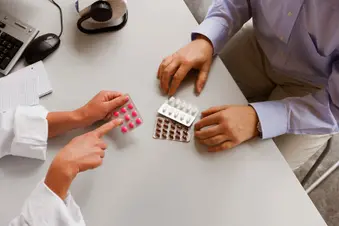
Scientists are looking for new ways to treat advanced prostate cancer in clinical trials. These studies test new drugs to see if they're safe and if they work.
They're often a way to try new medicine that isn't available to everyone. Your doctor can tell you if one of these trials might be a good fit for you and how to find one.
What You Should Know About Clinical Trials
Clinical trials for people with prostate cancer let researchers find new methods to treat the cancer and manage symptoms and side effects. One thing to keep in mind when you join one is that you may not actually get a chance to take the drug that scientists are testing. Some people in the trial may get the new medicine, but others will get the standard treatment for prostate cancer.
If you're part of the group that gets the new drug, it's likely you'll also get other, proven prostate cancer treatments along with it. Your doctor will discuss these details with you.
Benefits
If you're in a clinical trial, you may take new medicines that could improve your health. But even if you don't get the new drug, there are still advantages:
- You'll get detailed care and attention from the health care team that manages the study.
- Some clinical trials may cover all or part of your medical costs while you take part.
- When you volunteer for cancer research, the results could help other men with prostate cancer live longer.
Risks
The new treatment may not work as well as standard treatments.
There's also a risk of side effects from the drug the clinical trial is testing. You won't know ahead of time if those side effects are worse than those of your current treatment.
Show Sources
Photo Credit: Creatas/Getty Images
SOURCES:
University of Texas M.D. Anderson Cancer Center: "Making a Decision."
American Cancer Society: "Clinical Trials: What You Need To Know."
CancerCare: "Prostate Cancer."
Scher, H. New England Journal of Medicine, September 2012.
UCSF Medical Center: "Prostate Cancer Research."